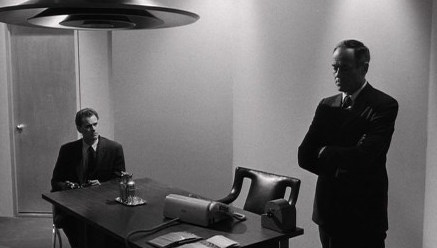“Either life entails courage, or it ceases to be life.”
E.M. Forster, “The Poetry of C.P. Cavafy”
Terry Teachout on the arts in New York City
“Either life entails courage, or it ceases to be life.”
E.M. Forster, “The Poetry of C.P. Cavafy”

I just spoke on the phone to Mrs. T’s nurse, who passed on a report from her doctors about her condition at midday Sunday. It now appears that she is holding her own—her blood pressure is down and her other medical requirements have remained steady (instead of spiraling upward, as would have been the case if she were deteriorating). While it’s too soon to say for sure how well her new antibiotic regime is working, these are all positive indicators.
The doctors suggested that I stay home today: they’ll be busy with her and other patients. This, too, is a good sign—I’m sure you can guess what it would mean if they told me to come to the hospital at once, or be ready to come on short notice. I plan to do FaceTime with her tonight.
Yes, it’s important not to jump to conclusions, but the situation this afternoon is definitely much more hopeful than it was twenty-four hours ago.
UPDATE: As of Sunday night, Mrs. T is no longer holding her own. I will keep you posted.
* * *
For better news about Mrs. T as of Monday night, go here.
To everyone who’s written to me here and in the social media with kind and encouraging words of all sorts, both for me and for Mrs. T, I want to thank you very much for being in touch. It means the world to me to know that you think I’m doing a good job of covering the arts in these fearsome times, and it means even more to know that you are so concerned about my beloved spouse and life’s companion.
I wish I could write to you all individually, or even to a few of you, but I’m afraid that I’m so pressed with deadlines and swamped with incoming mail that I have to resort to this impersonal but truly heartfelt note. Bless you for sending your good wishes. Now as always, they buoy me up.
* * *
Syracuse Stage’s revival of Peter Shaffer’s “Amadeus,” directed by Robert Hupp, is a thrilling staging of one of the best English-language plays of the 20th century, and it comes across online with exhilarating clarity. You’ll have to move fast to see it: Online “tickets” are only available at syracusestage.org through this coming Sunday. Once you purchase a ticket, though, you can view “Amadeus” at any time during the next two weeks, so I suggest you buy your ticket now, then come back and finish reading this review.

Mr. Shaffer’s best-remembered play, first performed by London’s National Theatre in 1979, tells the story of the troubled relationship between Antonio Salieri, a now-forgotten 18th-century court musician, and Wolfgang Amadeus Mozart, by common consent the greatest of all classical composers. It is not, however, a work of history but a profound, deeply unsettling parable of the mystery of human inequality. Mr. Shaffer’s Salieri, a successful but mediocre composer, cannot bear to live in the same universe as Mozart, a genius who is (in Mr. Shaffer’s heavily fictionalized rendering) ill-mannered, grossly vulgar and unworthy of his transcendent gift….
“Amadeus” was a colossal success when it transferred to Broadway, running for 1,181 performances and winning five Tonys. Since then, though, U.S. revivals have been rare to the point of invisibility, partly because the play calls for a big, costly cast (Syracuse Stage is fielding 19 actors) and partly because Miloš Forman’s Oscar-winning 1984 screen version, in which F. Murray Abraham brilliantly replaced Paul Scofield as Salieri, was so memorable….
This version, jointly mounted by Syracuse Stage and the drama department of Syracuse University’s College of Visual and Performing Arts, whose students cover the smaller ensemble parts, is artistically successful in every way, above all because of Jason O’Connell’s performance as Salieri. Mr. O’Connell, familiar from his appearances with Bedlam and the Hudson Valley Shakespeare Festival, is a burly stand-up comedian turned classical actor who is best known for his comic roles. He’s always had more in him, though—the excellence of his performance as Don Juan in the Phoenix Theatre Ensemble’s 2013 off-Broadway production of George Bernard Shaw’s “Don Juan in Hell” staggered me—and his Salieri is a heartbreaking study in malignant envy….
* * *
Read the whole thing here.The trailer for Syracuse Stage’s Amadeus:
Paul Scofield in a scene from the original National Theatre production of Amadeus:
F. Murray Abraham in the screen version of the same scene:
I’ve written an essay for the weekend Wall Street Journal that minces no words: the coronavirus pandemic is already a disaster for the performing arts in America, and things will get worse. Here’s an excerpt.
* * *
Of all the bad tidings brought by the coronavirus, here’s the scariest piece of news for lovers of the performing arts: The Metropolitan Opera is canceling the rest of its current season—and furloughing its orchestra members, choristers, dancers and stagehands. That reportedly comes to more than 500 people….

The Met is America’s largest performing arts organization. While it’s weathered severe budgetary problems in recent seasons, it’s successfully dealt with all of them—until now. As a result of the social-distancing lockdown in New York caused by Covid-19, the Met is staring down losses of up to $60 million. That’s a hit the company can’t survive without drastic measures in response….
What’s happening at the Met is happening at every performing-arts organization I know of, large and small alike. Opera, orchestras, dance companies, theater troupes, nightclubs: All have seen their revenues collapse overnight. And unlike the Met, which has a $300 million endowment, most of them have next to nothing in the bank to see them through the crisis….
I’m hearing much the same thing from coast to coast, though the institutional damage done by the coronavirus looks at first glance to be especially devastating to theater. Even the biggest regional theaters have either laid off staff or are days away from doing so…..
* * *
Read the whole thing here.Lotte Lenya sings “Pirate Jenny” (from The Three-Penny Opera) on “The World of Kurt Weill,” an episode of NET Playhouse originally telecast in 1967. Bertolt Brecht’s lyrics are sung in Marc Blitzstein’s English-language translation:
(This is the latest in a series of arts- and history-related videos that appear in this space each Monday, Wednesday, and Friday)
“Every smart person wants to be corrected, not admired.”
Marvin Minsky, The Society of Mind

A new episode of Three on the Aisle, the twice-monthly podcast in which Peter Marks, Elisabeth Vincentelli, and I talk about theater in America, is now available on line for listening or downloading.
Here’s American Theatre’s “official” summary of the proceedings:
This week the critics are coming to you from the living rooms, offices, and kitchens of their respective apartments to discuss the impact of the COVID-19 pandemic on theatre, both short- and long-term. They talk livestreamed and recorded shows, the struggles that theatre companies will face in the coming weeks to stay in operation, the art that we are turning to in the absence of live theatre, and life in general life under quarantine.
To listen to or download this episode, read more about it, or subscribe to Three on the Aisle, go here.
In case you’ve missed any previous episodes, you’ll find them all here.
| M | T | W | T | F | S | S |
|---|---|---|---|---|---|---|
| 1 | 2 | 3 | 4 | 5 | ||
| 6 | 7 | 8 | 9 | 10 | 11 | 12 |
| 13 | 14 | 15 | 16 | 17 | 18 | 19 |
| 20 | 21 | 22 | 23 | 24 | 25 | 26 |
| 27 | 28 | 29 | 30 | 31 | ||
An ArtsJournal Blog